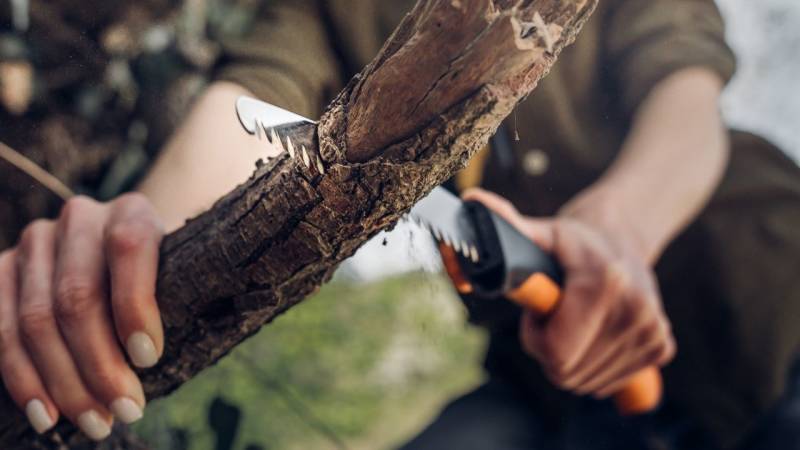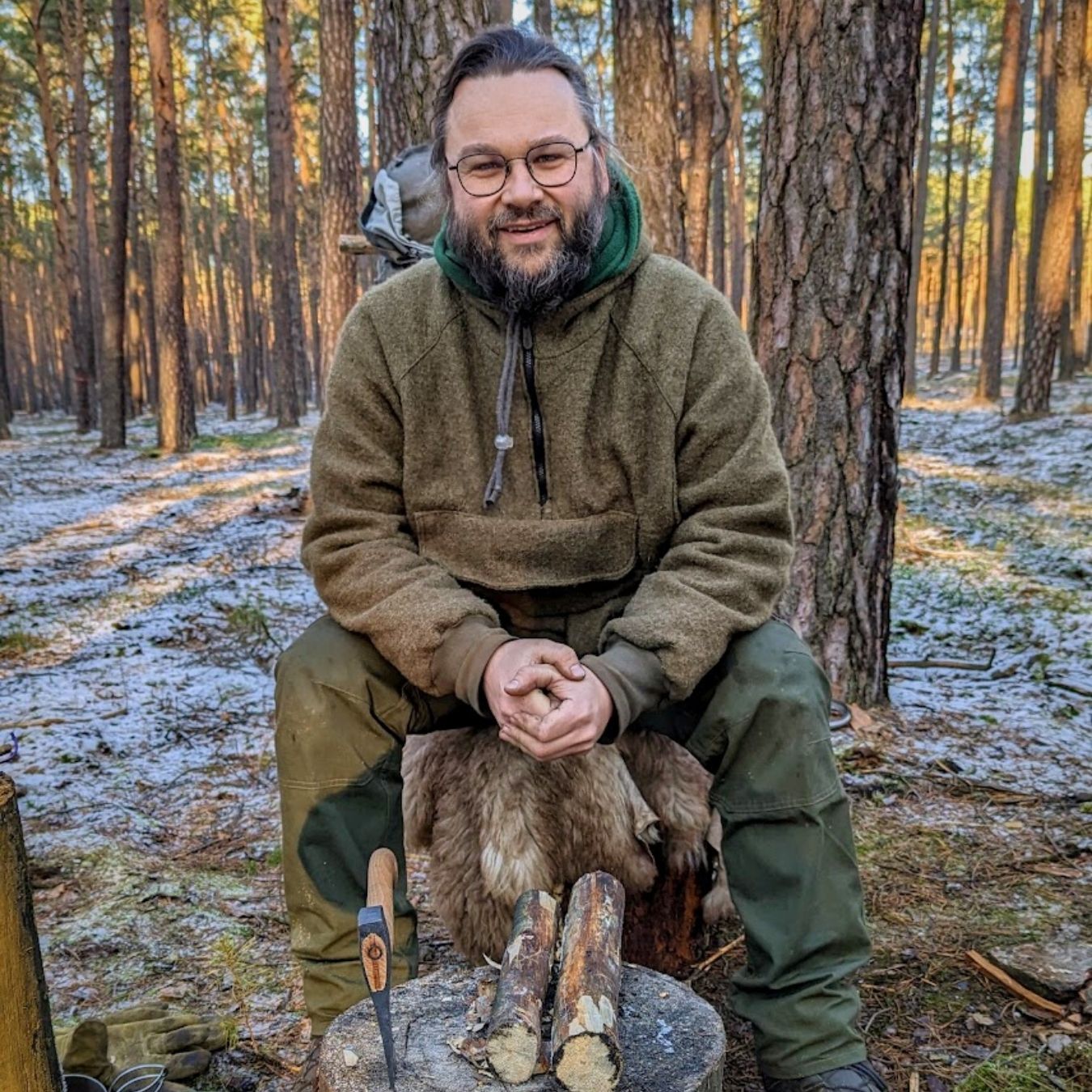
Survival skills
Nomen
Meaning
Survival skills are essential abilities and knowledge that enable individuals to survive and thrive in challenging outdoor environments. These skills are crucial for anyone engaging in activities such as camping, hiking, bushcraft, and wilderness exploration. They encompass a wide range of techniques, including fire-making, shelter-building, navigation, foraging, and first aid. Survival skills are not only practical but also empower individuals to connect with nature and develop self-reliance. They enable us to adapt to unexpected situations, overcome adversity, and increase our chances of survival in emergency situations. Learning and practicing survival skills can enhance our outdoor experiences and provide a sense of confidence and preparedness.

Examples
„Survival skills are essential for anyone who loves spending time in the wilderness. They are the abilities and knowledge that enable you to survive and thrive in challenging outdoor situations. Whether you're camping, hiking, or exploring remote areas, having a set of survival skills can make all the difference.“
„One of the most important survival skills is fire-making. Being able to start a fire in the wild is crucial for warmth, cooking, and signaling for help. Knowing how to gather tinder, kindling, and fuel, and using different fire-starting methods like friction or using a fire starter, can be a lifesaver in a survival situation.“
„Another vital survival skill is shelter building. Knowing how to construct a shelter using natural materials like branches, leaves, and debris can provide protection from the elements and keep you safe and comfortable. Understanding different shelter designs and techniques, such as lean-tos, debris huts, or tarp shelters, is essential for surviving in the wild.“
„Navigation skills are also crucial for survival. Being able to find your way in unfamiliar terrain using a map, compass, or natural signs like the position of the sun or stars can prevent you from getting lost. Knowing how to read topographic maps, use a compass, and navigate using landmarks can help you stay on track and reach safety.“
„Food foraging is another important survival skill. Being able to identify edible plants, mushrooms, and insects in the wild can provide you with a source of nutrition when food is scarce. Learning about different edible plants, their seasons, and how to prepare them safely is essential for sustaining yourself in the wilderness.“
„Lastly, first aid skills are crucial for survival. Knowing how to treat common injuries and illnesses in the wild can make a significant difference in an emergency. Being able to administer CPR, dress wounds, and recognize signs of hypothermia or dehydration can save lives. Having a well-stocked first aid kit and knowing how to use its contents is essential for any outdoor enthusiast.“
Origin
The word "survival" originates from the Latin word "supervivere", which means "to live beyond" or "to outlive". It has its roots in the concept of enduring and overcoming challenging circumstances in order to stay alive.
Survival skills, on the other hand, refer to the knowledge and abilities required to sustain oneself in the wild or in emergency situations. These skills have been developed and refined by humans throughout history as a means of adapting to and surviving in harsh environments.
The development of survival skills can be traced back to our early ancestors, who relied on their resourcefulness and ingenuity to navigate and thrive in the natural world. Over time, these skills have evolved and been passed down through generations, incorporating new techniques and technologies.
In modern times, the interest in survival skills has grown significantly, fueled by a desire to reconnect with nature, become self-reliant, and prepare for unforeseen emergencies. This has led to the emergence of various schools, courses, and communities dedicated to teaching and practicing survival skills.
Today, survival skills encompass a wide range of abilities, including but not limited to shelter building, fire making, foraging for food and water, navigation, first aid, and self-defense. They are essential for anyone venturing into the wilderness or seeking to be prepared for unexpected situations.
Synonyms
Bushcraft, Wilderness skills, Outdoor skills, Primitive skills, Nature skills, Survival techniques, Wilderness survival, Outdoor survival
Antonyms
Urban living, Dependence, Vulnerability, Helplessness, Ignorance, Weakness, Reliance, Incompetence
Relatives
Wilderness, Bushcraft, Outdoor, Primitive skills, Self-reliance, Foraging, Shelter building, Fire making
Historical and cultural importance
Survival skills have a rich historical and cultural significance that spans across different civilizations and time periods. Throughout history, humans have relied on their survival skills to navigate and thrive in challenging environments.
One of the earliest examples of survival skills can be traced back to our hunter-gatherer ancestors who had to develop techniques for hunting, gathering food, and creating shelter. These skills were essential for their survival in the wild.
In more recent history, survival skills played a crucial role during times of war and exploration. Soldiers and explorers had to learn how to navigate unfamiliar territories, find food and water sources, and protect themselves from various threats. These skills often determined their chances of survival in hostile environments.
Survival skills also have cultural significance in indigenous communities around the world. Many indigenous cultures have passed down traditional knowledge and techniques for surviving in their specific environments. These skills are deeply rooted in their cultural heritage and are often shared through storytelling, rituals, and practical training.
In today's modern world, survival skills have gained popularity through the rise of outdoor activities such as camping, hiking, and bushcraft. People are increasingly interested in learning how to survive in the wilderness, reconnect with nature, and become more self-reliant. This cultural shift has led to the development of survival schools, workshops, and online communities dedicated to teaching and sharing survival skills.
Overall, the historical and cultural relevance of survival skills highlights their importance in human history and their continued significance in our modern lives. They not only provide us with practical knowledge for surviving in challenging situations but also connect us to our ancestral roots and the natural world.
More information about the term Survival skills
Survival Skills: Mastering the Art of Wilderness Survival
Survival skills are essential for anyone venturing into the great outdoors. Whether you're an avid hiker, a camping enthusiast, or simply someone who enjoys spending time in nature, knowing how to survive in the wilderness is crucial. In this article, I will introduce you to the fundamental survival skills that will help you navigate and thrive in the wild.
1. Shelter Building
One of the first priorities in a survival situation is finding or constructing a shelter. Knowing how to build a shelter using natural materials such as branches, leaves, and debris can provide protection from the elements and keep you warm and dry. From simple lean-tos to more complex debris huts, mastering the art of shelter building is a vital survival skill.
2. Fire Starting
Fire is not only a source of warmth, but it also provides light, a means of cooking food, and a way to signal for help. Learning different fire-starting techniques, such as using a fire striker, bow drill, or magnifying glass, can be a lifesaver in a survival situation. Understanding how to gather and prepare tinder, kindling, and fuel is equally important.
3. Water Sourcing and Purification
Water is essential for survival, but finding safe drinking water in the wilderness can be challenging. Knowing how to locate water sources, such as rivers, streams, or even dew on plants, is crucial. Additionally, understanding various water purification methods, such as boiling, using water filters, or chemical treatments, can help prevent waterborne illnesses.
4. Navigation and Orienteering
Getting lost in the wilderness can be a terrifying experience. That's why having basic navigation and orienteering skills is essential. Learning how to use a compass, read maps, and navigate using natural landmarks can help you find your way back to safety. Additionally, understanding how to use the sun, stars, and other natural elements for navigation can be invaluable.
5. Food Foraging and Hunting
When stranded in the wilderness, finding food becomes a top priority. Knowing how to identify edible plants, mushrooms, and insects can provide sustenance in a survival situation. Additionally, learning basic hunting and trapping techniques can help you catch small game for food. However, it's crucial to have proper knowledge and respect for the environment to avoid damaging ecosystems.
6. First Aid and Medical Skills
Injuries and illnesses can occur in any survival situation. Having basic first aid and medical skills can make a significant difference in your ability to treat injuries and prevent further complications. Learning how to clean wounds, dress injuries, and administer CPR can be life-saving when medical help is not readily available.
7. Mental Resilience and Adaptability
Survival skills go beyond physical techniques. Mental resilience and adaptability are equally important in a survival situation. Being able to stay calm, think clearly, and make rational decisions can greatly increase your chances of survival. Developing a positive mindset, practicing mindfulness, and learning stress management techniques can help you stay focused and resilient in challenging situations.
Remember, mastering survival skills takes practice and experience. It's essential to continuously educate yourself, seek training opportunities, and challenge yourself in controlled environments. By honing these skills, you'll gain the confidence and knowledge needed to navigate and survive in the wilderness.
Back to overview

